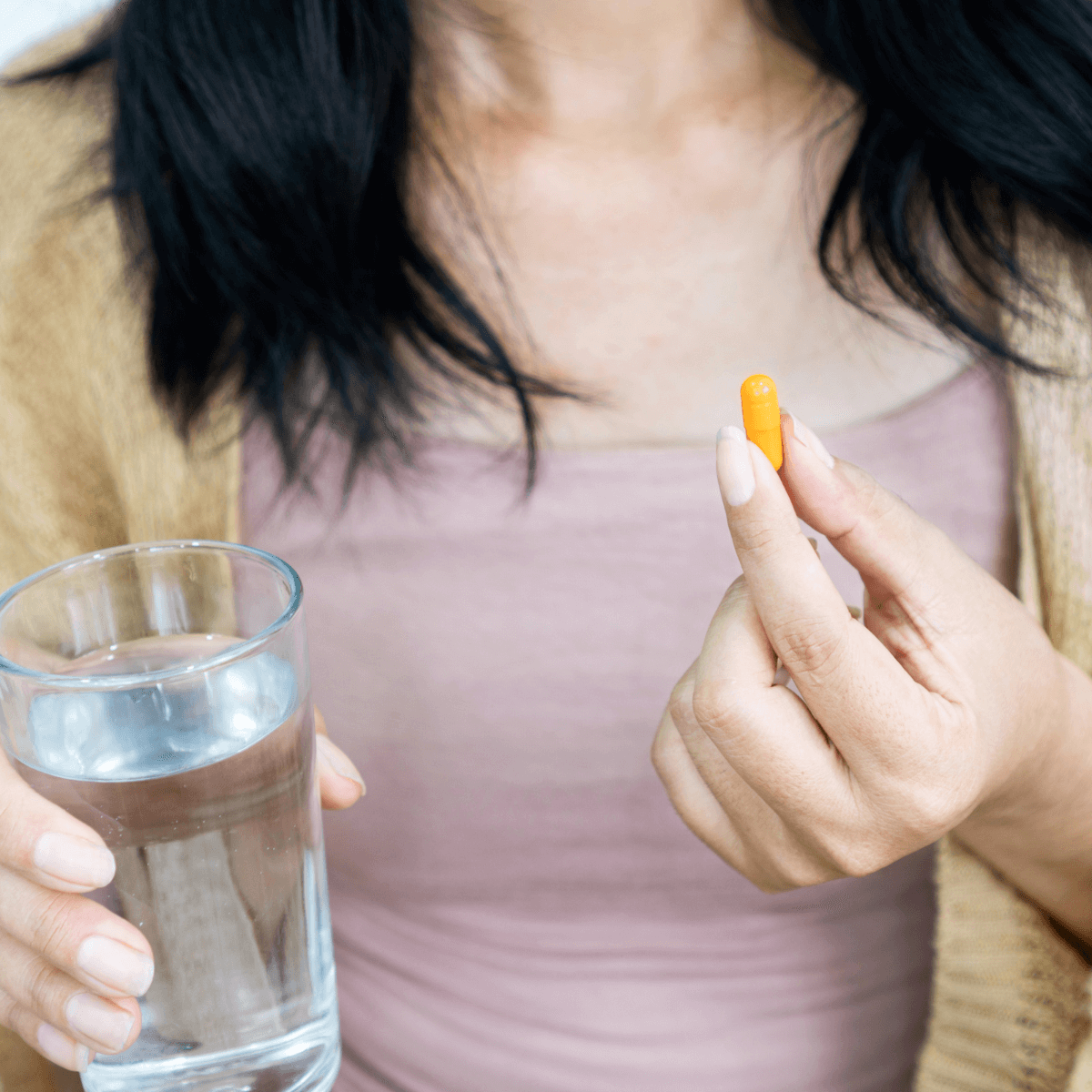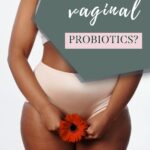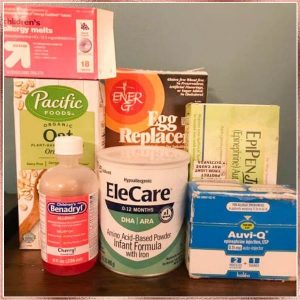When I was in my early twenties and super sexually active (remember those days?), I really struggled with keeping things, er, not itchy and/or uncomfortable down there. In fact, I remember being on the fourth or fifth infection in a row and breaking down about it.
I was so young, out of tune with my body, and uneducated about my own vagina! I had never heard of preventative measures like probiotics for vaginal health, or even WHAT vaginal pH was, for that matter. The itching got so bad that I sobbed and told my partner at the time that I’d probably picked up an STI from a toilet seat at a gas station or a bar. (Oh, the naivety!)
He patted me on the back and very calmly suggested that I make a gyno appointment before we hauled off and assumed I had something sexually transmitted from a toilet seat. Not sure why my brain didn’t suggest I might have something as simple as a non-STI infection–which I did–but such is life with high functioning anxiety and abstinence-only sex education.
His rationality paid off because, when I saw my gynecologist and told her how much discomfort and pain I’d been in, she, too, gave me an “oh, honey” look and told me that these kinds of infections are common and directly related to the pH of your vagina.
She said we could test for STIs if either myself or my partner had had another sexual partner, but since we hadn’t, she instead opted to do a culture for vaginitis.
I was taken aback because, well, no one had ever really explained this to me. My poor little anxiety-ridden self was making up stories about gas station toilet seats and sexually transmitted diseases because no one had told me that your vagina is super sensitive to pH changes from things like having unprotected sex, taking antibiotics, douching, and your menstrual cycle.

This site contains affiliate links, meaning that we earn a small commission for purchases made through our site. We only recommend products we personally use, love, or have thoroughly vetted.
Trying to Conceive and Vaginal pH
I’m here to do the same thing my partner and gynecologist did for me, friend, but for you, and in a much more mature context.
If you’re trying to conceive (TTC), it’s probable that you’re “doing the grown up” more than normal, especially when you’re ovulating. And while unprotected sex can lead to a baby (yay!), semen can actually disrupt the pH of your vagina, which can lead to issues like itchiness, pain, and discomfort.
So what’s a girl gotta do to keep a vagina healthy while having lots of sex?? The answer involves a healthy vaginal pH. We’re telling you all about it, including recommendations from several different experts & all the tips on probiotics and gels to help maintain a healthy vaginal pH.
The vagina is incredibly sensitive, and it’s important to keep yours in good working order while TTC.
A huge thanks to Fairhaven Health for sponsoring this article, allowing us to take extra time and care to do a deep dive into factors that influence women’s vaginal health. Prioritizing science and high-quality ingredients, Fairhaven Health provides people with the products and information they need to naturally optimize their reproductive health and fertility.
Why Should Your Vagina Be pH Balanced?
Let’s start with the basics.
Vaginas are finicky little body parts that can make our lives miserable or super pleasurable, and there’s really not a whole lot in between. We especially want to keep them happy when baby making is in the cards, which makes sense, right?
Just like every other part of your body, your vagina has a certain pH (acidity or alkalinity) where it’s most comfortable. (You might remember from high school chemistry that a pH below 7 is acidic, a pH above 7 is basic, and a pH right at 7 is considered neutral).
Believe it or not, different parts of your body work best at different pH ranges! For instance, the pH in your stomach is really low, around 1.5, so it can digest food easily. Blood needs a slightly higher pH, around 7.4, to optimally move oxygen and carbon dioxide throughout your cells.
The vagina, however, needs a fairly acidic environment to flourish, which is around 4.5. This is because the lower pH kills off dangerous bacteria (and let’s face it, bacteria can swarm in areas very near the vaginal canal) and keeps yeast growth at the right levels.
In other words, keeping your vaginal pH right around that 4.5 mark isn’t just about science–it’s about your own physical comfort!
Fortunately, your vagina can recruit some buddies to help maintain its acidic state. Here’s a big word for you: lactobacillus. It’s a class of healthy bacteria that actually colonizes in your vagina and produces lactic acid, lowering the pH of your vaginal canal.
The really cool thing about lactobacilli is that it also produces hydrogen peroxide and other chemicals that kill off dangerous germs (including some STIs) before they can take hold. Thank you, lactobacilli.
Things That Negatively Affect Your Vaginal pH
Having vaginal flora with a low proportion of lactobacilli bacteria has been linked to concerning reproductive outcomes, including infertility, preterm birth, premature rupture of membranes (water breaking early), and even miscarriage.
Gentle reminder: there are lots of different causes of infertility and miscarriage, which are so often beyond your control, mama. This information is not meant to bring on guilt or shame, it’s meant to empower you for the future.
While your vagina naturally has ways to maintain its acidity (like Lactobacillus), there are behaviors and products that can really mess up this balance. Let me break this down for you reallllly carefully–please don’t do anything on the list below if you want to keep a healthy vaginal pH:
1. Douching
Repeat after me–the vagina is self cleaning! You do not need to rinse the inside of your vagina. You just end up killing and washing out the good bacteria in your system and introducing new germs into your vaginal canal.
2. Using soap
Once again, please don’t put anything in your vagina. Soap will definitely disrupt the pH levels and healthy bacteria living in your vagina. While using a mild soap just around the vulva (not in the vagina) is okay, plain old warm water is better in most circumstances!
3. Vaginal Steaming
While some cultures use vaginal steaming after menstruation, sex, or life-altering events, be careful. This practice can kill “good” bacteria, increasing your risk of infection (not to mention increasing the risk of burns on your hoo-ha!)
Definitely don’t use vaginal steaming during ovulation if you’re TTC or during pregnancy.
4. Staying Wet
Swimming and leaving a wet swimsuit on for a while kills lactobacilli while creating the perfect environment for bad bacteria to grow, so if you like to lounge at the pool, be sure to change out of your swimsuit as soon as you’re done.
How Vaginal pH Changes Over the Course of Your Cycle
I know, I know…I said your vagina needs an acidic pH to stay safe. But when you’re TTC, there are actually times that you’ll need a higher pH.
If you’re using the fertility awareness method to track ovulation, then you know your cervical mucus changes right around ovulation. It gets clear, slick, and stretchy, like egg white.
But the texture and amount of discharge isn’t all that changes around your fertile window. The pH of ovulation cervical mucus is around 7.0, higher than it typically is in the vaginal canal.
Not only is slippery cervical mucus more conducive to baby-making activities around ovulation, but it’s also safer for sperm! Unlike the lactobacilli hanging around your vaginal canal, sperm don’t thrive in an acidic environment. In fact, semen has a pH between 7.2 and 7.8. That’s why it’s so great that your vaginal pH naturally rises during your fertile window.
Speaking of things that are slippery, it’s super important to choose a fertility safe lubricant when you’re trying to make a baby. You want one that’s going to match optimal pH levels for sperm health and motility. That’s why we recommend Fairhaven Health’s BabyDance Fertility Lube.
Basically, your vagina’s pH (like so many other things) changes cyclically based on your menstrual cycle. At the beginning of your cycle when you’re bleeding, the pH tends to be closer to that of blood (around 7.4).
During the follicular phase, before ovulation, your vaginal pH lowers to around 4.5. pH raises again during baby-making time to closer to 7 (the just-right pH for sperm to swim in!) Finally, vaginal pH will dip once more before your period starts.
How Supplements & Gels for Vaginal Health Can Support TTC
Since semen is less acidic, lots of sex can really get your vaginal pH out of whack, which can mean un-fun things like itching and burning in your vagina.
Which begs the questions. What can I do to help maintain a healthy vaginal pH?Are there any vitamins for female pH balance out there? Are there vitamins that can help? What about safe gels?
Um… sort of! While they’re not technically “vitamins,” you can take probiotics for vaginal health. Our favorite is the IsoFresh Probiotic Dietary Supplement.
To be clear, even though we’re talking about vaginal probiotics benefits, you don’t take them vaginally. They’re taken orally, just like a vitamin pill, but they’re full of 5 different strains of happy little bacteria, including:
- Lactobacillus rhamnosus,
- Lactobacillus reuteri, Lactobacillus acidophilus,
- Bifidobacterium lactis, and
- Bifidobacterium longum.
The friendly bacteria in the IsoFresh Probiotic can help replenish Lactobacillus in the vaginal canal, which in turn can lower levels of pesky yeast.* Plus, this formula is vegetarian, nut-free, and contains no artificial colors or flavors!
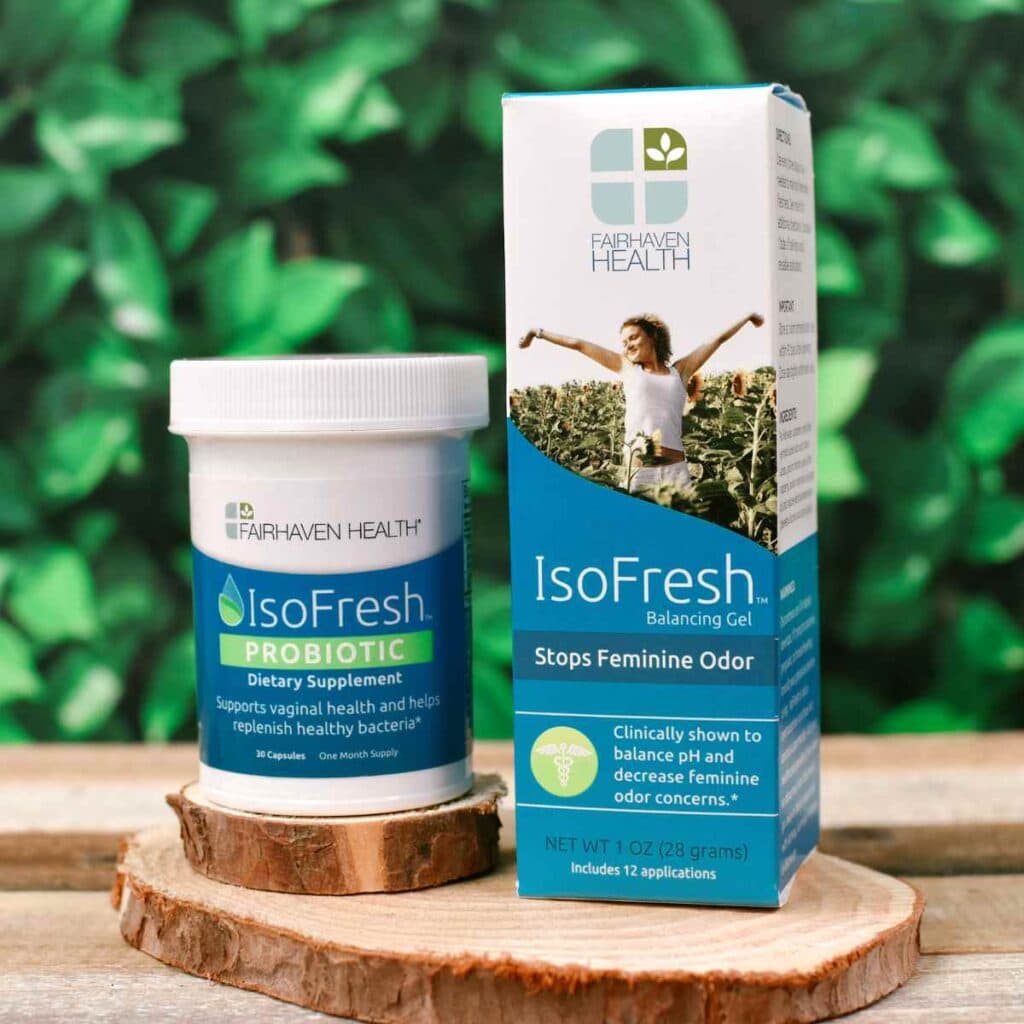
Another tool we to help keep your pH in check is the IsoFresh Balancing Gel. IsoFresh Balancing Gel is a water-based, paraben-free, bioadhesive gel that supports healthy vaginal pH with an advanced pH buffering system of lactic acid, sodium lactate, and sodium hydroxide.
It won’t kill friendly bacteria and can help keep the vagina in the optimal acidic range!
Now, I know what you’re thinking…which range will this help restore your vagina to? This part is important! It’s recommended that you use Isofresh before and/or after your fertile window, but not during.
Remember, that’s when your pH levels should be lower! When you’re in your fertile window, we recommend you stick to BabyDance Fertility Lubricant which matches the pH levels of your fertile-quality cervical mucus and sperm.
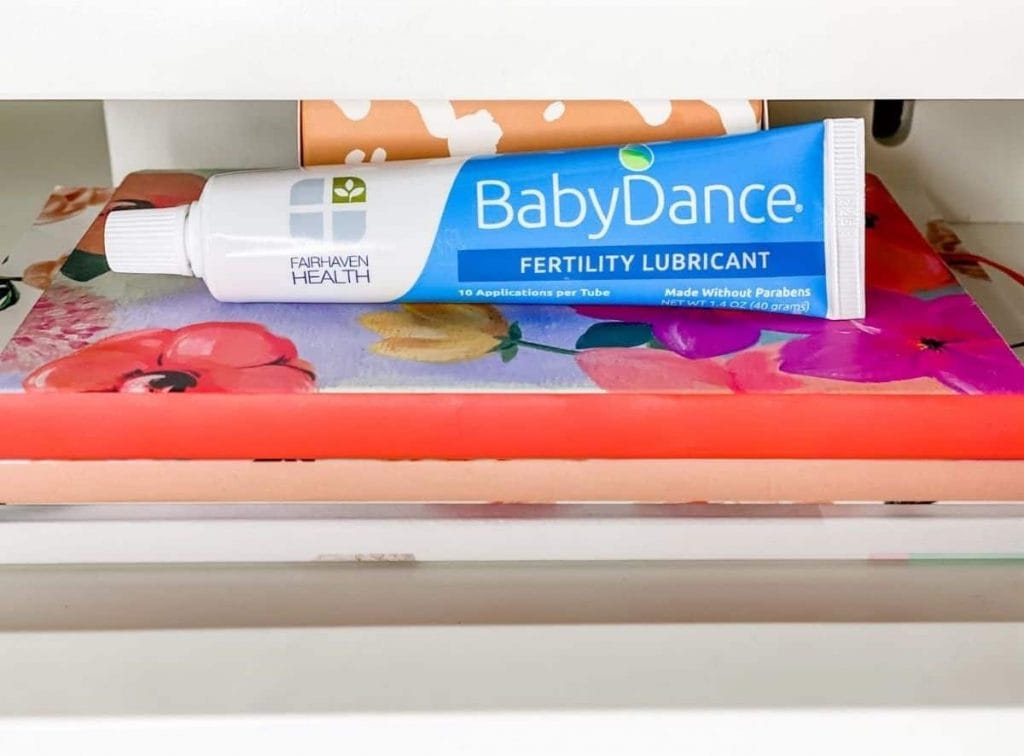
But, before and after your fertile window, if you’re feeling like you need a little help getting your pH levels back to normal, this balancing gel will do the trick.
Do Vaginal Probiotics Work?
You might be wondering how probiotics for vaginal health even work. After all, can you really swallow a pill and then expect good bacteria to start growing in your lady bits?
In short, yes. These bacteria can survive all the way through the digestive tract, allowing “crosstalk” between your gut and vaginal microbiota.
This basically means they leave your body (the way all food waste waste leaves your body), the bacteria can be transferred to the vaginal canal simply because of its proximity to your rectum. Kind of gross, but also, that’s where the magic happens!
So not only are there studies showing that oral probiotics can make it into the vaginal microbiome, there’s some evidence that they are beneficial, too. In a randomized, placebo-controlled trial of 64 healthy women, oral use of probiotics led to a significant increase in vaginal lactobacilli (the good bacteria).
For a small group of women with an imbalance of bacteria and yeast, treatment with probiotics was even more helpful. Taking lactobacilli probiotics got rid of symptoms of having too much yeast.
There are also several ongoing studies about whether or not taking probiotics can enhance fertility. While these studies are happening, there isn’t yet enough data to show that they actually do enhance fertility. Studies are definitely in agreement that taking a vaginal probiotic can’t hurt, which is good to know.
While the current results are still mixed, that just means we need to learn more about how awesome probiotics can be for your vaginal health!
Vaginal Probiotics Benefits
So you can see why we rave about IsoFresh Vaginal Probiotics, especially when you’re trying to make a baby.
That lactobacilli we’ve been praising is super important. Just remember that if you do get pregnant, you’ll need to stop using the probiotics, as they haven’t been tested for safety in pregnancy. Personally, we’d stop them at about 8 days past ovulation.
*These statements have not been evaluated by the Food and Drug Administration. This product is not intended to diagnose, treat, cure or prevent any disease.
🌸 Ready to make a change? Dive deeper into the world of vaginal probiotics with IsoFresh. Prioritize your well-being and take the first step towards a balanced and healthy reproductive system. 🌸
Probiotics for Vaginal Health FAQ
Vaginal probiotics are supplements that can replenish the naturally occuring “good” bacteria inside the vaginal canal. They may be delivered orally (like a pill that you swallow), or in the form of a vaginal suppository.
Several studies say yes. Taking an oral probiotic designed for vaginal health can raise the number of “good” bacteria in your vaginal canal.
While you can’t just pop a pill and expect immediate results, you might see changes pretty quickly! According to one study, 6 out of 10 of the women had relief of symptoms within just 1 week of starting probiotics.
Interested in starting vaginal probiotics for yourself? There are several trusted probiotics for vaginal health that you can research. We love the IsoFresh Probiotic Dietary Supplement.
Most commercially available lubricants have parabens and are hypo- or hypertonic, which means they have too low or high of salt concentration relative to vaginal tissues causing water to be pushed into, or sucked out of vaginal cells. As you can imagine, this isn’t healthy for your vagina. Rest assured, IsoFresh Vaginal Gel is not only paraben-free but it is also isotonic & iso-osmotic, making it a safe option for your most sensitive tissues.

